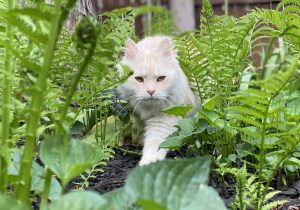We must feed cats the proper nutrients to give them the tools in their toolbox so their body can feel good and thrive.
Cats have no plant or carbohydrate requirements in their diet. They lack the digestive enzymes to break down and metabolize those ingredients. Their jaws are not capable of grinding plant matter. A diet high in vegetation can lead to an overabundance of glutamic acid, which can lead to thiamine deficiency and vomiting. Cats can synthesize 11 amino acids on their own. Their requirement is 22 amino acids to survive. In feeding the right proteins, we give them their essential amino acids they are not producing. The essential fatty acid called arachidonic acid plays a vital role in fat utilization and energy production. They cannot synthesize taurine and vitamin A, so they must obtain it from the proteins they consume. Their digestive tract is very short and straight. Being a true carnivore, they don’t have to break down plant cellulose. A higher level of taurine must be added to the diet if they are fed any fiber or grain. All these traits of a cat show us they are true obligate carnivores and need to be fed the appropriate meat-based diet to survive and thrive.
Many of the health problems we are seeing in cats are related to being dehydrated. Cats rely on obtaining their moisture requirements from their diet. When being fed a dry food or extruded cat kibble from the beginning of their life, not only does this lead to dehydration health issues, but the cat will also only want to recognize that food for the rest of their lives. All dry food is high in carbohydrates, which a cat has no need for. That leads to weight gain and can cause diabetes. It is sprayed with synthetic vitamins to meet the basic minimum requirements. When feeding cats this type of food without hydration, we will see things like urinary issues, organ damage, electrolyte imbalances, lethargy, cancers, digestive issues, vomiting and poor appetite over time. A cat’s instinct is to eat the proper meat, not drink water, for hydration. Therefore, a transition to the proper diet of fresh, raw meat is important and, biologically, species-appropriate. Their requirement is a high-moisture, high-quality animal protein, moderate fat and no carbohydrate diet. This can be a journey, as most cats like their crunchy “cereal” foods. We know that the result of the nutritional benefits and health of our kitties outweigh the small period of frustration during the transition.
We must feed cats the proper nutrients to give them the tools in their toolbox so their body can feel good and thrive. They look up to us to care for and feed them what their body needs! QCBN
By Sandy Haffner
Sandy Haffner is a pet nutrition specialist and owner of Preskitt’s Pawz ‘N’ Clawz.






Leave a Reply